I’m in absolutely no sense a biblical scholar. I’m nothing more than a lay preacher who was called by a local American Baptist congregation because I was willing to fill the pulpit each Sunday. I took about five courses in the Bible in undergraduate.
I don’t remember a lot about those courses, but a handful of things have stuck with me. Let me get just a little bit preachy for a second. (And forgive me for any heresies).
One idea that I just can never shake is that one of the central themes in the Gospel of Luke is the great reversal. It’s most succinctly stated in 13:30, “Indeed there are those who are last who will be first, and first who will be last.” It’s all over the text.
The Magnificat of Mary, “He has brought down rulers from their thrones but has lifted up the humble.” (Luke 1:52).
“For all those who exalt themselves will be humbled, and those who humble themselves will be exalted.” (Luke 14:11)
Your tax-deductible gift helps our journalists report the truth and hold Christian leaders and organizations accountable. Give a gift of $30 or more to The Roys Report this month, and you will receive a copy of “Baptistland: A Memoir of Abuse, Betrayal, and Transformation” by Christa Brown. To donate, haga clic aquí.
And, of course, “Jesus answered them, ‘It is not the healthy who need a doctor, but the sick. I have not come to call the righteous, but sinners to repentance.’” (Luke 5:31-32.)
The way that I understand Christianity is that Jesus was especially concerned with people on the margins of society. The sick, the poor, and the outcasts were high on his priority list. Thus, churches (being the extension of Jesus’ ministry), should focus their efforts on those exact same people.
But the data says that is not happening. Just the opposite in fact. Religion in 21st century America has become an enclave for people who have done everything “right.” They have college degrees and marriages and children and middle-class incomes. For those who don’t check all those boxes, religion is just not for them.
I’m going to stop quoting Scripture now (not my strong suit) to describing the data (which is way more comfortable for me). The conclusions are unmistakable: Religion has become a luxury good, and that’s leaving most of society on the fringes, yet again.
Let’s start with that old chestnut that I roll out from time to time — the basic relationship between education and religious disaffiliation. This is 15 years of the Cooperative Election Study. These samples visualized here represent over 570,000 total responses, and in many years, the individual sample size is north of 60,000.

It doesn’t take a statistical wizard to figure out the general trend line here. People with higher levels of education are less likely to identify as atheist, agnostic or nothing in particular when it comes to religion. Yes, if you just include atheists and agnostics, the trend does reverse itself. But nonreligious people are not just atheists and agnostics. In fact, most nonreligious people are nothing in particular when it comes to religion. That’s a point I make in “The Nones” and also every time I talk about this stuff.
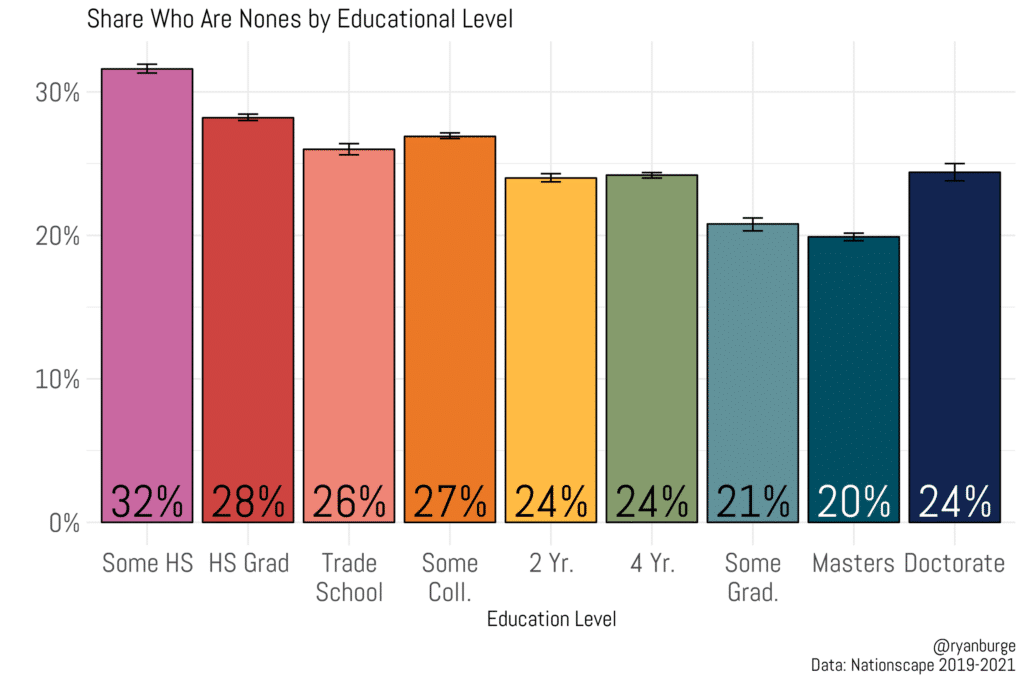
More educated people are more likely to claim a religious affiliation on surveys. It’s true in every single wave of the Cooperative Election Study. It’s also the case in the Nationscape survey, which has 477,000 respondents. They even have 4,000 people with doctoral degrees in their sample.
The most likely to be nonreligious? Those who didn’t finish high school. As education increases, so does religious affiliation. The group with the highest level of religious affiliation is those with a master’s degree. I think this is likely due to the fact that the majority of folks with master’s degrees are in not purely academic pursuits. Instead, they earn graduate degrees in things like education and business. But that’s a discussion for another day.
Of those with doctorates, 24% are nonreligious. That’s the same rate as those with a four-year college degree. Again, it’s hard to look at these numbers and make some big claim about how education chases people away from religion.
Obviously, affiliation is just one piece of the puzzle, though. Religious attendance is another key component to the religiosity story. So, I did the same general analysis with the CES data, but this time just focused on those who attend religious services weekly. Again, all 15 waves.
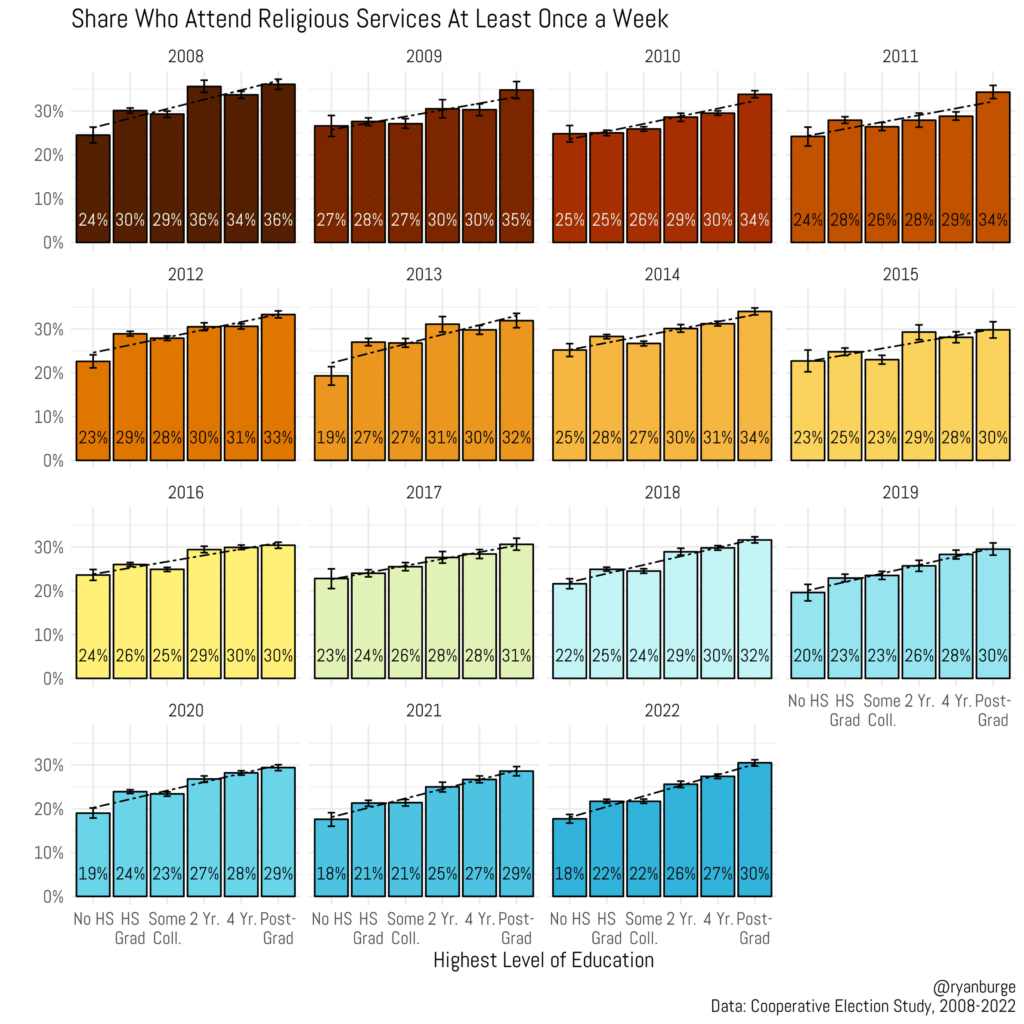
Their trend is just as unmistakable: Those who are the most likely to attend services weekly are those with a graduate degree. The least likely to attend are those with a high school diploma or less. And these aren’t small differences, either. The last few years have seen nearly a 10-point gap in attendance from the bottom to the top of the education scale.
Let’s take this a step further and inject income into the mix as well. So, I divided respondents into those with a high school diploma or less and those with a four-year college degree or more and then calculated the share who attend religious services weekly across the income spectrum.
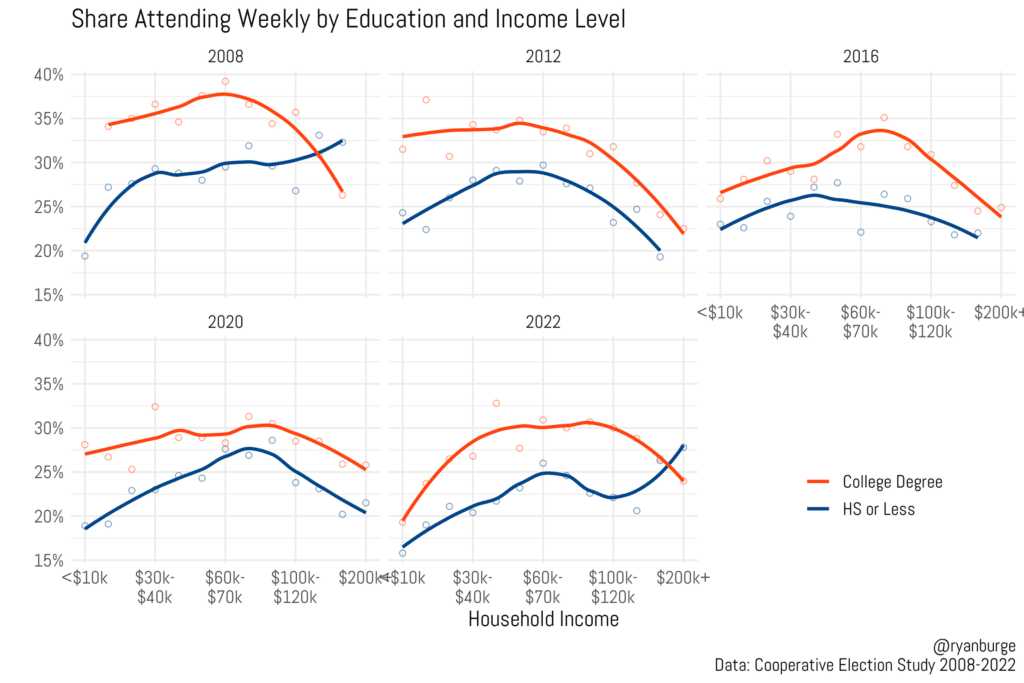
The first to note is that college educated people attend church at higher rates than those with a high school diploma or less. That’s consistently the case across almost all income brackets. There are a few little squirrely things that happen at the very top end of the income spectrum, but that’s probably due to small sample size.
But notice the overall shape of the orange lines, especially in the last few years of the Cooperative Election Study. They are curvilinear in shape — meaning low on the edges and high in the middle. That’s certainly the case in 2016, 2020 and 2022.
That tells an interesting story about the interaction of income and religious attendance. The group that is the most likely to attend services are not the poor, nor the wealthy. Instead, it’s people who smack in the middle of the income distribution. This analysis points to the following conclusion: The people who are the most likely to attend services this weekend are those with college degrees making $60K-$100K. In other words, middle class professionals.
Let’s throw another factor into the mix now — marital status. The imagined ideal for many for a good American life is a college degree, good job, stable marriage. Does religion have any place for those who are not married? Or are divorced or separated?
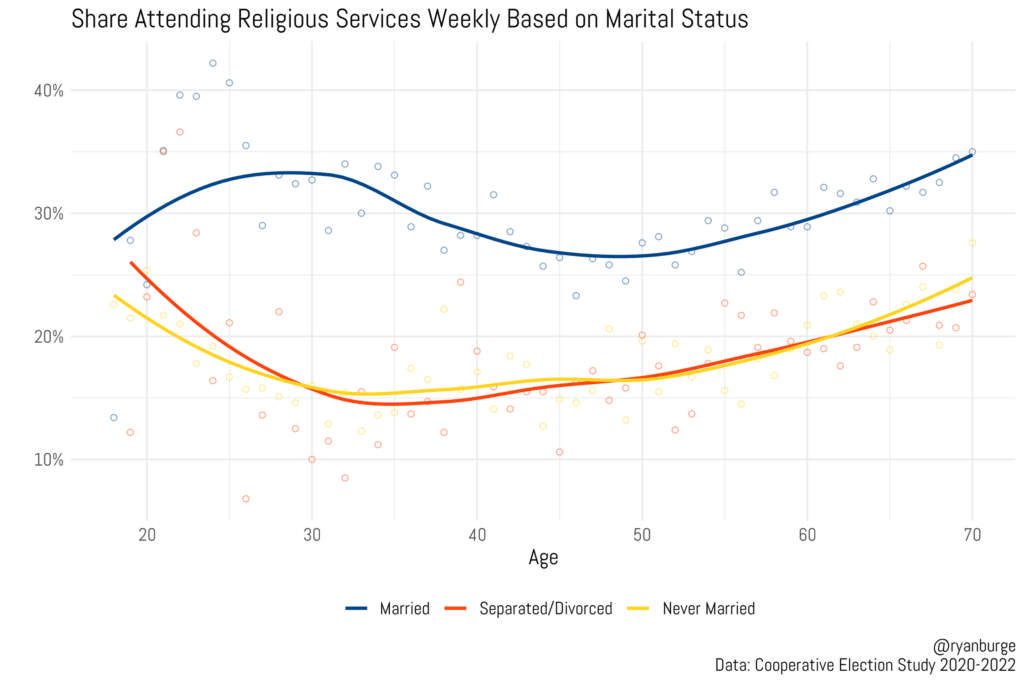
The Cooperative Election Study only asks about current marital status, so if someone has been divorced and remarried, that wouldn’t really show up in this data, by the way. But, good gracious, this is a crystal-clear result. Married people are much more likely to be in a religious service than those who are divorced, separated, or never married.
And these are not small gaps, either. Among 40-year-old married people in the sample, nearly 30% are attending services weekly. Among those who are separated, divorced or never married — it’s half that rate: just 15%.
That gap persists all the way through the life course, too. Even among 60-year-olds, it’s still there. About 30% of married retired folks are in churches; it’s just 20% of those who are not married. Marriage leads to much higher levels of religiosity — at any age.
One last little bit of analysis before I stop, just put a finer point on this. I divided the sample into four groups based on married or not married and parents of children or not, then calculated the share attending weekly.
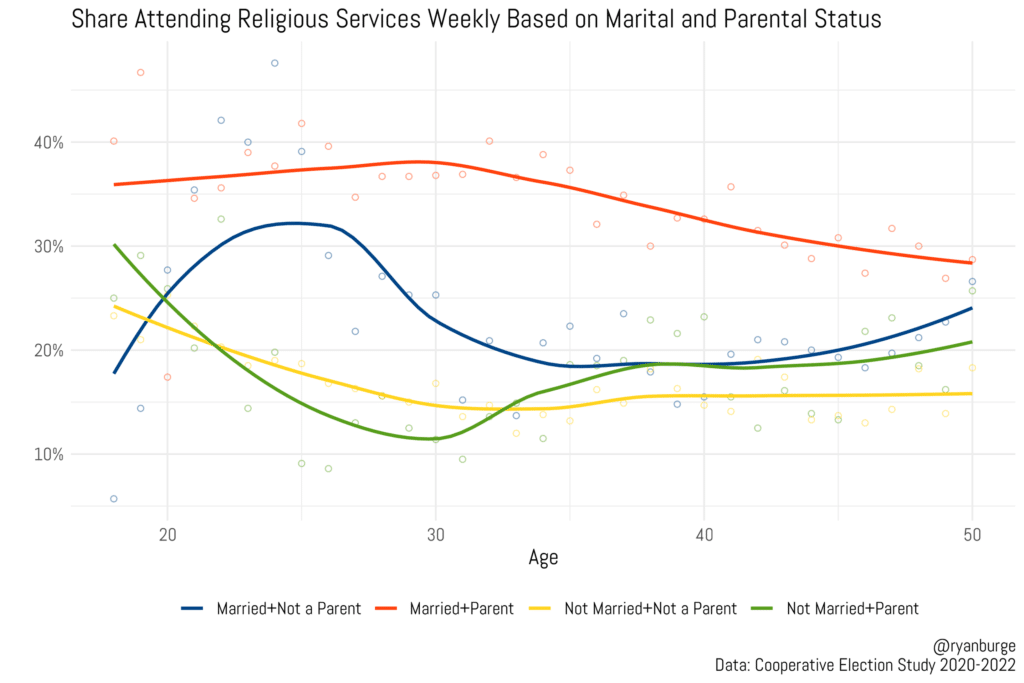
The clear outlier here is folks who are married with children. Among those who fit both criteria and are under the age of 30, 37% are attending weekly. That does begin to decline as the age category moves up. I am guessing that’s because folks who have children later in life tend to be less religious, but that’s just a hunch.
Among those who are married without children, attendance is fairly high in their mid-20s. But then it drops down to being no different than those who are not married and have no children or are not married but are parents.
These results are hard to ignore and should sound some major alarms for any person of faith who is concerned about the large state of American society. Increasingly religion has become the enclave for those who have lived a “proper” life: college degree, middle class income, married with children. If you check all those boxes, the likelihood of you regularly attending church is about double the rate of folks who don’t.
This is also troublesome for American democracy, as well. Religion, at it’s best, is a place where people from a variety of economic, social, racial and political backgrounds can find common ground around a shared faith. It’s a place to build bridges to folks who are different than you. Unfortunately, it looks like American religion is not at its best.
Instead, it’s become a hospital for the healthy, an echo chamber for folks who did everything “right,” which means that it’s seeming less and less inviting to those who did life another way. Do I think that houses of worship have done this on purpose? Generally speaking, no. But they also haven’t actively refuted this narrative.
I was always told that the job of a preacher is to comfort the afflicted and afflict the comfortable. Maybe we need a lot more of the latter going forward.
Las opiniones expresadas en este comentario, que se publicó originalmente en Religión desconectada, no reflejan necesariamente los de The Roys Report.
 Ryan Burge es profesor asistente de ciencias políticas en la Universidad del Este de Illinois, pastor de la Iglesia Bautista Estadounidense y autor de “Los nones: de dónde vienen, quiénes son y hacia dónde van.”
Ryan Burge es profesor asistente de ciencias políticas en la Universidad del Este de Illinois, pastor de la Iglesia Bautista Estadounidense y autor de “Los nones: de dónde vienen, quiénes son y hacia dónde van.”




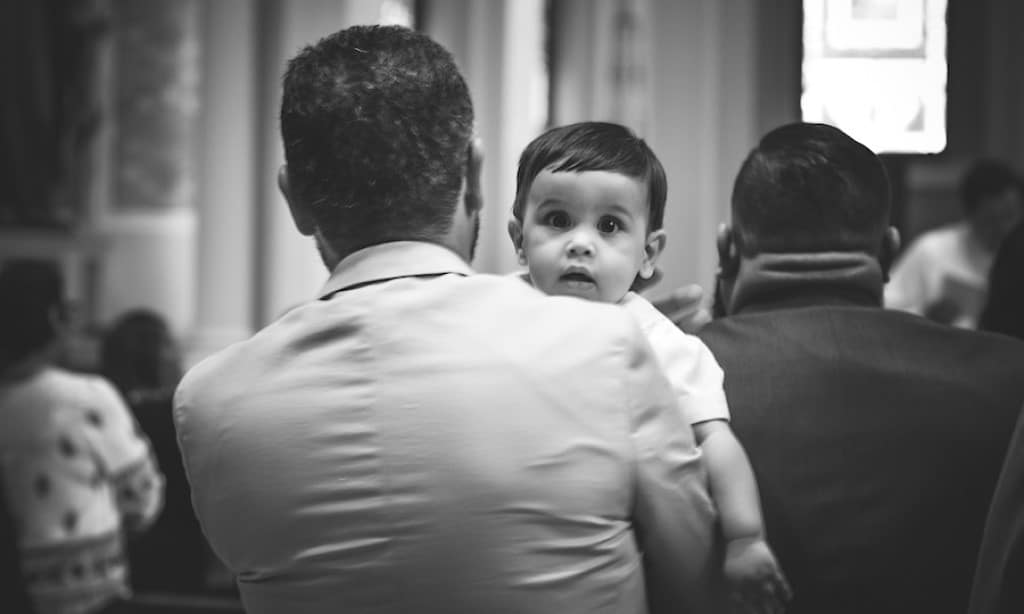
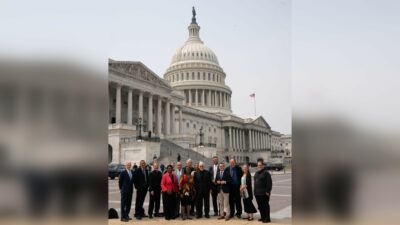

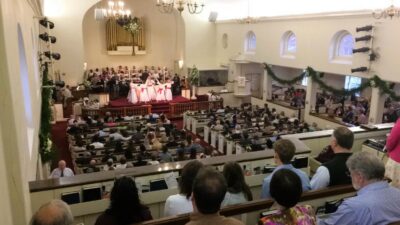
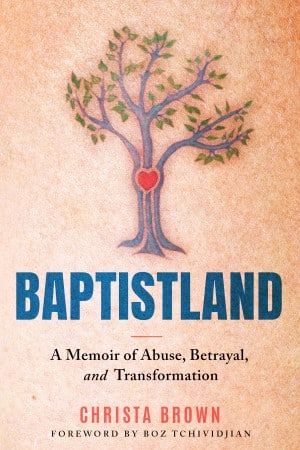

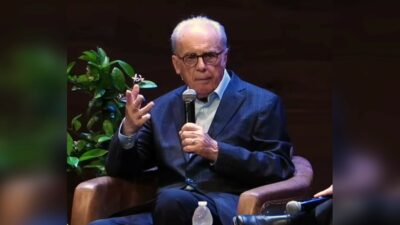










52 Respuestas
Most new churches are out in wealthy areas and not lower – poor areas. The family unit of giving is not sufficient there…even though they are in need of a Saviour
There are countless churches in the poor parts of Chicago. Some have church buildings. Many meet in schools and strip malls.
How many churches, regardless of location, are committed or even interested in ministering to those who’s lives are messy. It’s all about pretending that you have it together rather than confessing, being vulnerable, and receiving healing through the body of believers. Those that don’t fit the cultural idea of “success”, or are in crisis, don’t care about putting up a front and consequently find church irrelevant.
That is an astute comment about the todays church. Thank you
I’m like an occasional amateur version of Ryan Burge in Australia. We have the interesting situation that educated people are more likely to attend church but less likely to identify as Christian in the census.
I recently updated my paper on how the Australian Church varies in strength across geography and demography: https://mappage.net.au/?a=gm_cc_au (needs large screen – lots of interactive charts!)
I was surprised that the American Church shows a similar educated leaning, and even that education correlates with Christian identification, unlike here.
When you’re struggling financially, the last thing you want is to feel the shame of everyone in church seeing you pass the offering plate to the next guy without putting anything in it. For many lower income folks, church is just another bill collector to deal with. Also, many of us work those low-paying jobs that require us to work on Sunday. Worship teams, lighting, and smoke machines are expensive. Maybe if churches spent less on entertainment they might have something to help people with. Church planting seems to be a primarily suburban thing. That’s where the money is. The poor Christian is an embarrassment to the prosperity gospel crowd. Our poverty means we’re cursed. Their success and wealth mean God is blessing them.
M J Belko:
Never forget that Jesus didn’t have a home while he lived down here among us. He identified with all people because he came to seek and save the lost, and we are all lost without his help. The “prosperity gospel crowd” is just a group of people who think God speaks through wealth. He does not. He speaks through pain and suffering. He speaks through the daily grind of doing the right thing unrewarded. He speaks through physical pain and emotional pain and the kind of pain that comes from being lonely and alone in a world that admires popularity. He speaks to the suffering and the silent and the prisoner. He speaks to those who earnestly seek him.
He is not impressed with wealth. After all, he owns the cattle on a thousand hills and makes clear we are just grass that will fade away some day. All we have, all we are, every single blessing we have ever received has come from his hands. And we are meant to be the hands of God in this world. That means we are to love EVERYONE, regardless of where the money is. We have to go out and hug people and invite them to come to church to hear about Jesus and his everlasting love for all.
MJ all I can says is PERFECT. Church should be worship and humble. Some mega churches are 20 minutes of rock and roll and 40 minutes of simple-minded blathering. My opinion is based on covid lock down and using you tube for worship. Went via you tube to many churches. And the pattern seems the same. Need the humble, hymn and choir churches back again.
This has not been my church experience at all. We served in a medium sized church in the suburbs for many years and ministered to many people with messy, broken lives. We loved seeing God forgive, heal, restore and grow willing people. It was exhausting and rewarding.
We now attend a large suburban church and we are very intentional about ministering to immigrants, the poor, and the elderly.
I’m not sure I would call anything a “luxury good” that is common in the middle class. That seems to defy the definition of the term.
Beware of confusing correlation with cause. Does a good education cause people to be more religious or is it that religious people are more likely to earn a college degree and a middle class income? Does belief in “purpose” affect a person’s diligence (in school and on the job)?
Also don’t forget the stereotype of “middle class morality.” It has long been true that the upper class and the lower class were less concerned or observant of “morality” issues that the respect-seeking middle class.
Sorry, not much news here.
Larry Jackson
A great analysis on the state of churches today. Thanks to the author.
A church I left years ago celebrated mother’s day on that particular Sunday by promoting a special flowers and chocolates celebration of the mother’s in the church that day.
How awful for the childless, those who had lost children, those who had their kids taken away to foster homes.
Church that day ignored the broken women, the sad, the lonely, those desperately seeking Jesus. They needed the comfort and support, not the well off.
Churches go after middle class family structures and ignore the broken, the sinners, the lost, in my opinion.
“A church I left years ago celebrated mother’s day on that particular Sunday by promoting a special flowers and chocolates celebration of the mother’s in the church that day”
I agree that this is so sad to see.
“Mothers Day ” and “Fathers Day” are cosy secular commercial inventions.
I am disappointed when churches act like they are a biblical tradition.
Every day is a day to honour mothers and fathers.
We are called to reach out to the orphans, widows and fatherless to help ameliorate their pain, not add to it with such ridiculous rituals.
This is a great article, detailed yet accessible. Thank you for your research.
The irony is that an affluent church is impoverished by its lack of diversity.
Moreover, what can I, living in comfort, learn from those who are not.
Very interesting, but unsurprising analysis.
My experience in a few churches over the last decade or so has been a reflection of this analysis: those who live life “right” come together to feel good about living right, host an occasional “singles” event (which shames those who dare to be 30+ and unmarried), and plan a “mission trip” overseas….yet when asked about serving those right here on the south and west sides of Chicago, the responses are little more than ungracious, apathetic, “well it’s their fault that (insert comment on Black-on-Black crime or fatherless homes)” speeches that reveal their TRUE hearts. (I’d rather them say, “I just really want to go to Kenya”.)
Oh, and throw in a debate on a disputable matter (because we’d rather spend our time fighting over a woman leading a ministry then going out and actually ministering).
Until the world sees the church serve the most vulnerable and marginalized with the love of Christ, it will continue to question our relevance.
After serving in vocational ministry for the last 18 years, I have seen this first hand. From my experience, churches market to the middle class nuclear family. Those that give regularly & abundantly are singled out and elevated to leadership status based on income/giving/standing within the community, not so much quality of character. These individuals are awarded time with senior leadership and platforms, as long as they continue to give/serve, etc. All are smaller representative of the Mars Hill ecosystem. There is an abundance of abuse, control, covering up of abuse and spiritual mishandling.
I’ve been writing for decades (in books and articles) that the church has nothing for singles and that singles were headed for the exits. For only 15% of singles to be in church is sad. It’s also sad that of the singles who DO attend church, the vast majority are women. Christian single guys aren’t in church at all. If you want to meet a decent Christian man, don’t look for him in church – he hasn’t been there in 40 years (which is when I started taking notes on this stuff).
I experience the phenomenon firsthand when I lost my husband suddenly/tragically in my mid 50s. My then 19 year old son and I quickly went from being solidly middle-class to lucky to be lower middle class. And seemingly overnight I was shut out of a lot of what my church “had to offer” because of my change in marital and financial status.” I was even told to change my seat at a Sunday Seminar because couples were coming and couples like to sit together. The seat I was offered, was literally on the edge of the room. No irony there! I left the seminar that day and left the church all together a few months later..
“Does religion have any place for those who are not married? Or are divorced or separated?”
Based on the strictly anecdotal evidence of mature single people, divorced people, and people with complicated marriage and family situations who are active in my doctrinally conservative congregation, I think so.
“Increasingly religion has become the enclave for those who have lived a ‘proper’ life: college degree, middle class income, married with children.”
This could be. But it could also be that authentic religious conversion and community can lead at least some people toward a better life trajectory, degree or marital status notwithstanding. I would suggest that neither scenario is exclusive of the other, nor are results guaranteed.
Why am I getting a heavy whiff of anti-bourgeois sentiment here? Don’t middle-class people need Jesus at least as much as anyone else? This all just seems a bit ironic coming from a tenure-track academic at a mid-sized state university, who is also a published author with a respected niche professional online presence, all while finding the time to preach on Sundays.
Miguel -
I’d be interested in what you are doing to make those who are unmarried, separated or divorce feel welcome; please share it with other churches. I was single well into my 40s, and for years, I was asked why I felt out of place in singles ministries full of 25 year olds or “ministered to” with a “what’s wrong with you?” mindset – the same one that is likely driving many older singles away.
There’s nothing wrong with being middle class. It’s that the church has become a bourgeois bubble, with too few willing to minister outside of it. So I think you’re asking the wrong question. We should be looking in our bourgeois bubble called the church – not in the spirit of “there’s nothing wrong with being middle class”, but in the spirit of “don’t those outside of this bubble need Jesus too? What can we do to invite them in?”
Marin, not being single myself, I can’t speak for the unmarried people in my congregation, nor would I dare. Figuring out what any member of any particular demographic group needs to feel welcome is beyond my pay grade, much less control. Perhaps Dr. Burge could enlighten us all to best practices, after all the statistical broad brushstrokes with which he’s painted.
But to respond, my local church doesn’t have a whole lot of programs for life stages or lifestyles. We’re a relatively recent plant, just a few years old. We don’t own our own building, and we’re not very big.
On average, we are fairly highly educated; it being a college town, there are a few grad students, some folks with advanced degrees, and we have our share of upwardly mobile people with large families, promising or established careers, and nice homes. But we also have recent college graduates who are trying to find their way in life, struggling to pay bills. We have some late middle-aged people who are trying to figure out what’s next after a divorce and/or a professional or financial setback. We also have young adults without degrees who are working retail.
And you know what? All these people come together across classes and backgrounds to worship, lead worship, take communion and serve communion, and take part in and lead small groups. And that’s the key. What we’re doing together is rooted in lectionary readings, church calendar, and older rhythms of prayer and liturgy, with the Eucharist anchoring it all.
A lot of today’s churches and preachers with platforms are focused on popular contemporary human concerns, when Jesus said to “seek first the kingdom of God”. (Matthew 6, the whole thing. So relevant.)
The author was honest enough to admit scripture his not his strong suit. It is unfortunate that he is “filling” a pulpit. The role of the Preacher is to proclaim the Gospel and Christ Crucified. Understanding scripture is key. Luke 13:30 does not translate into Christ wanted to focus on those living in the margins. All are sinners and all are called to repent.
Churches that preach the Gospel grow where God intends them to.
I suspect many in the survey attend heretical churches focusing on social platforms/outreaches (i.e. abortion, LGBTQ+, DEI, gender-affirming care). Little or no mention of the true Gospel message is ever proclaimed. Most are attended by the middle and upper class.
Look no further than the Presbyterian, ECLA, and Episcopal Churches.
The Roys Report seems to overlook these churches in its effort in “Restoring the Church”. Look at the recent review of the UCC. Charlatans and criminals are rightly pointed out each week. Tens, maybe even hundreds, are victimized. In the meantime, millions perish.
“Luke 13:30 does not translate into Christ wanted to focus on those living in the margins.”
Jesus literally spent His life ministering to those in the margins, to the point the Pharisees were chastising Him over it. We read of Him with tax collectors, the sick, the woman at the well, the woman with the alibaster jar, the woman caught in adultery…..all marginalized.
If we are truly His disciples who desire to grow in His image, we are to minister to those living in the margins. And yes, that includes ministering to those who have abortions, identify as LGBTQ+, and are of other races and colors.
Church isn’t a club to feel good while you simply mix and mingle among the likeminded.
Marín:
The tax collectors were wealthy, so from one perspective, not marginalized.
We should not, and cannot, eliminate or minimize Jesus’s love for ALL PEOPLE, including those you would not consider marginalized.
He loved all. When you concentrate on one demographic, you eliminate large numbers of people.
Jesus never did. He was comfortable dining with the wealthy and he was comfortable lifting up the needy. In short, he loved and ministered to people who had LOTS of money and also to people who had none.
He did not engage in identity politics and he did not prioritize any particular group. It is patently false, in my opinion, to claim that Jesus somehow values poor people more than wealthy people.
He doesn’t and he didn’t.
cinthia-
Actually while tax collectors were wealthy, they were villainized and “othered”, partially due to HOW they went about collecting taxes. That is why the religious Pharisees wondered why Jesus was bothering to spending time with them. Marginalized does not necessarily mean poor.
And I was not saying exclude any group or that Jesus only loves specific people. I’m actually saying the opposite: When we look around in our churches and see only people who are “like us” (whatever that means to you) amidst communities full of those who aren’t….we should be asking ourselves “why” and “what can we do to better minister to and invite more of those who are outside of our doors in”.
We love the feel good sayings of “Jesus loves all of us” and “we all need Him”; I’m challenging us to ACT like it so our congregations LOOK like it.
Marín:
When we share the Gospel with unbelievers, we are “acting like it” (your words.). There is no way you or I can know who will respond. And there is no way to know who will want to come to church. You cannot judge a church based on the assumption that, because its members all seem to be from the same class, they are somehow not inviting others to come, too. It is a leap to suggest a church is not trying to reach out simply because its members all seem similar.
Our job is to spread the Gospel. If people become Christ-followers as a result of our witness, we can praise God and the work of the Holy Spirit for that outcome. If those people decide to attend our church, so be it. If they prefer to attend a different church, so be it. The point is not to create diversity in church: The point is to reach souls for Christ. In my opinion, we need to concentrate on the Gospel and leave the “social engineering” to God.
That said, I agree that we as Christians need to do everything we can to get the good message out there, into the community. We can definitely become very comfortable in our little world and need to take Christ’s admonition seriously.
Marin
You have perverted the Gospel to push a social agenda.
Churches are not organizing groups that promote gender-affirming care, lgbtq+ rights, same-sex marriages, abortion rights, and diversity. You continue to see the world as victims and oppressors- while ignoring the Eternal consequences of sin.
The verses quoted in the article do not point to Jesus and the marginalized.
Instead to:
Gentiles entering the Kingdom with the Jews
Humbling yourself before the Lord
No one enters the Kingdom by good works
Sinners need to repent
Over 90% of Israel lived in poverty in the time of Jesus, yet it was not the common theme of His interactions. Miracles were performed for both the average and the upper class. He did not spend his life “literally” speaking to those on the margins. When he spoke read what what was written in it’s entirety.
He spoke of turning away from sin and chastised those that didn’t.
The woman at the well is more than Jesus meeting a divorced person. Read all of Chapter 4.
The sick and dead were from both classes. The story of the woman with the alabaster jar points not to the woman in particular, but to Jesus teaching the Pharisee about forgiveness.
No, Church is not to be club of like-minded people gathering to feel good.
Jim-
You put a WHOLE lot of words in my mouth. I said nothing about gender-affirming care or social justice or whatever. I called no one a victim or an oppressor.
I just said we (as the church) need to do better about welcoming those who are different from us in our midst. It’s sad that so many congregations have become little more than social clubs and echo chambers. It’s also sad that my calling this out (in confirmation with the author of this entry) has led to jumping to huge conclusions, complete with jargon I never said or referenced.
How will we win the world for Christ by only staying “among our own”, collectively talking down about those outside of our bubble – while refusing to minister to them and invite them in to actually experience who Jesus is? I welcome an answer.
Marín:
Sorry, but Jim is correct here. Your job as a Christian is to share the Gospel with others. Period. You are not called to get more marginalized people into your church building. You are called to love them and tell them the good news. Period.
By adding on to the requirements of church goers, beyond what Jesus himself called us to do, you are definitely perverting the Gospel.
Churches all over this country welcome people who are different. Further, churches are MEANT to be welcoming places for those who come. It is a place to encourage like-minded believers and it is a place to share the Gospel with others who may not know about Jesus. It is both.
“Collectively talking down about those outside of our bubble” has never been my experience. Where are you seeing that happen? Do you have first-hand experience of this, or are you assuming it is the case based on the make-up of some churches?
cinthia-
“Churches all over this country welcome people who are different. Further, churches are MEANT to be welcoming places for those who come.”
And we are FAILING. The data shows it. That’s been my point all along. We have congregations that continue to be the most segregated gatherings in our nation, are bleeding members, being led by prideful and manipulative pastors, being infiltrated by false gospels, and seeing more and more people (especially young people) get disillusioned with, and ultimately question the relevance of, the church. But every time I point this out and say “hey, what we are doing is NOT working”, you get defensive about it. Clearly you see what’s going on as working. I disagree.
And these threads are just a sample of the “talking down about outsiders” attitudes I’ve come across in multiple congregations, Bible studies, and Christian circles – labeling, accusing, and name-calling outsiders (a few favorites are: “pagans”, “SJWs”, “woke”, “baby killers”, and “God haters”). Those words are not said to have real conversations. They aren’t even said out of loving concern. They are said to feel superior.
And I see sharing the gospel and inviting people to my church and/or Bible study as part of ministering to them. I guess I’ll leave out the invite next time. That seems to be where there’s a problem.
The purpose of the church=glorify God & edify those “IN CHRIST”. Christians ought to be careful using broad-brush observations. There is a difference being spiritually bankrupt vs financially bankrupt. The beatitudes are spiritual conditions not economic/racial. Jesus ends ethnocentrism. True Israelites spiritually were those with the faith not race of Abraham(Gal3-6:16).A personal antidote to this article, my grandfather was well off. He lost his friend, in a plane crash. He later was shown his friend’s journal, which stated that he would do anything to see grandpa saved. Ultimately his life My grandpa never saw a Christian funeral. All the money would never bring his friend back. But he realized that day Christ ‘s death/resurrection is the only salvation for his dead soul. This article obfuscates spiritual truths with economic/racial/ marital truths. Go learn the Bible.
This author in another article states…
”As I write in my new book, “The Nones: Where They Came From, Who They Are, And Where They Are Going,” the most likely reason for the dramatic rise in the religiously unaffiliated is simple secularization — the theory that as nations become more educationally advanced and economically prosperous, they will become less religious.
https://religionnews.com/2021/03/09/as-a-pastor-i-hope-my-flock-comes-back-as-a-religion-demographer-im-more-realistic/
How does his analysis in this article where he says “Religion in 21st century America has become an enclave for people who have done everything “right”, jive with his previous statement that “as nations become more educationally advanced and economically prosperous, they will become less religious”?
Shouldn’t there be a corollary? His two observations seem at odds with one another.
I have an MS degree. I am retired military. I continue to work as a civilian. I am married and have two children. My parents taught me the gospel and realized the value of education. I have an undergraduate degree from a conservative Christian university and a graduate degree from a medium sized state university. My wife came from a broken home. Her grandmother taught her the gospel. All of the churches we have attended and currently attend, before and after marriage, value stable families which are a part of the backbone of a stable country. They loved/love our country. The United Sates has done more than any other nation to lift the world out of darkness. My ancestors and my wife’s ancestors came through “The Castle” and Ellis Island. We should celebrate stable families and American values. We should seek to lift the brokenhearted and help them find Jesus, a stable mate and children.
Paul –
Loving and celebrating the country, and loving and celebrating Christ are two VERY different things that are both fine on their own merit, but should NOT be conflated. Jesus Christ came before the US, and came to save ALL – including those not from or in the US. We also aren’t somehow “better” than others because we are Americans.
And not all Christians will have spouses and/or children; not all are called to (we read Paul’s writings on this in the NT). Let’s not treat the singles and/or childless in the church as if they need “special help” due to some sort of “inferior” status. That approach is actually why many stay away from the church.
Marin I appreciate The steady manner in which you push back on some of the comments.
So many times as I read this comment section my heart sinks. I wish I had the ability to express what I’m thinking and my beliefs about the Gospel and the theme of the whole of Scripture in which you can see that the measure of one’s heart is in how one cares for the poor the sick and the oppressed.
I often look for your replies because you capture what it is that is off kilter in how Christianity is being lived out in this day and time.
It’s almost as if when secular culture took on social justice, Evangelical Christians said “here, take all of it” and now any reference to justice has become a bad word. And yet it is central to the gospel.
Evangelicals want to say that it’s about sin and our need for forgiveness and redemption and of course it is. But once you have received forgiveness how do you live? How do you minister to the poor and the weak and the marginalized? It’s what comes after we experience forgiveness that changes lives. It’s what makes Christianity relevant to the suffering the broken lives. It’s the message of hope and healing.
Tricia,
Here are your words:
“But once you have received forgiveness how do you live? How do you minister to the poor and the weak and the marginalized? It’s what comes after we experience forgiveness that changes lives. It’s what makes Christianity relevant to the suffering the broken lives. It’s the message of hope and healing.”
Good questions. I believe the answer lies in the power of the Holy Spirit. He is the one who changes lives. I also believe it is very important to understand the difference between the Gospel of Christ and a social justice “gospel” that is not part of Salvation. Christ calls us to follow Him. He calls us to live a life worthy of that calling. He does not call us to create diverse churches or churches that encourage sin or churches that engage in social engineering.
This seems to be the fault line between what Marin is espousing and what Jesus calls us to be and do.
cinthia-
“He does not call us to create diverse churches or churches that encourage sin or churches that engage in social engineering.”
It’s my belief that if the church is truly living out the gospel, and truly ministering to the poor and weak and marginalized in this world, that the OUTCOME will be diverse congregations, where people of all colors and backgrounds can come together at the foot of the cross as brothers and sisters in Christ.
I see it as a problem that our congregations are segregated social clubs (the data proves this), and that any challenge to this is viewed as “welcoming sin” or “social engineering” rather than what it really is: falling short of our mission as the body of Christ to evangelize, disciple, and minister to ALL – not just those “like us”.
Thank you so much, Tricia.
I actually learn a lot from reading and engaging with those on here; it’s giving me a lot of insight into differing viewpoints (and subsequent behaviors) that I haven’t understood – and to be honest, had often judged.
And many of the challenges I propose here I’ve had to face myself over the years: as it relates to this topic, I’ve asked myself why I automatically veered towards Black churches (I now attend a predominantly white one, which has been an eye-opening experience that has grown my faith and discipleship relationships immensely), why my “inner circles” were full of people “just like me” (Black, educated, upper middle class, 2-parent households, ideologically left of center), and why I was more eager and ready to travel to South Africa when I live in a ministry minefield here on the south side of Chicago. I view asking myself these questions – and challenging others to do the same – as a part of growing in Christ. I’ve had to lay a LOT of my beliefs, experiences, and judgments at the foot of the cross.
I hope others see the opportunity in having conversations like this; the inner and outer growth that can come from talking with the “other side” versus shutting the “other side” down with labels, name-calling, assumptions, and judgments.
I’m grateful for those who have also reached out to me on other platforms to continue conversations and share appreciation for my point of view. And I’m grateful to Julie for creating this board.
Marín:
Here are your words:
“It’s my belief that if the church is truly living out the gospel, and truly ministering to the poor and weak and marginalized in this world, that the OUTCOME will be diverse congregations, where people of all colors and backgrounds can come together at the foot of the cross as brothers and sisters in Christ.”
I am so sorry, Marin, that I have to keep disagreeing with you. I know your heart, as always, is coming from the right place. As a Christian sister, I respect your position. Unfortunately, I think your view of the Church is based on how it WILL be when Jesus returns, not how it is in reality.
In reality, in this fallen place, even Christians tend to congregate with those who are most like them. It is a human characteristic to want to be with similar people. We cannot force our brothers and sisters to hang out with those who come from backgrounds that are completely alien to their own.
When we see Jesus, when we are all together in heaven, the “human” part of our nature will finally be vanquished. We will be like Jesus, because we will see him as he is and not how we THINK he is. We will no longer concentrate on our individual differences and instead will rejoice in our shared love of Christ.
cinthia-
I agree we cannot force people to hang out with those different.
I also say if we have to force Christians to do so – the same Christians who will quote feel good “Jesus loves all people of all colors” scriptures – that speaks to our own sin and how loving others is little more than “feel good Sunday school fluff” to us. I mean, let’s quote it, but not actually DO it, right?
To refuse to welcome and/or minister to those different from ourselves under the guise of “Jesus will do that when He comes back” shows that perhaps we’ve missed the whole point of the Great Commission. It makes us no different than the world we are called to save. I expect unbelievers to take the stance of “I just stick to my own kind.” Not Christians.
Where did it say “only welcome those who are like you or whom you feel comfortable around”? I recall Paul talking about “becoming all things to all people”.
My wife and I have been in 8 churches over the last 41 years because of military moves, civilian moves and family needs. Two Southern Baptist, Two Independent bible, two independent Presbyterian, one Reformed church and a start up joke. The 2 Independent churches and one of the Presbyterian churches were pastored by DTS grads. Good consistent systematic theology. I grew up in doctrinally sound Baptist churches and my undergrad professor of German was the head of the Lochman Foundations’ Old Testament Translation Committee for the NASB. The family is the standard for God’s people. People need to hear this and from doctrinally sound pastors in doctrinally sound churches. Our goal should always be normalcy. We should not praise a lower standard that is elevated in many “contemporary” churches.
This article is less than logical (Biblical) as the author hints at the beginning in many aspects:
a. First of all, it considers Christianity a “religion” which it is not when it is for real.
b. Secondly it does not take into consideration a primary factor…..”how long” the “religious” people have been Christians in some sense. Isn’t it logical to think that those who have been believers for a long time might be more “successful” (to use the author’s outlook) in any field they are involved in such as marriage, parenting, income, etc., etc.? Having a middle class income does not therefore mean one is spending it all on oneself!
c. Having a “church building” in a locality does not mean you have the “church” in a Biblical sense. The “church” is the believers……the body of Christ. By God’s grace it may include people from all walks of life and educational standard but we can expect it will include the “least” of society for sure as advocated by the author.
Ernie –
a. While we know Christianity is about relationship and not religion, for data purposes (e.g. the census), Christianity is referred to as a religion. I view this as more of a social science construct and not about what we believe.
b. To say that those who are believers are likely to be more “successful” is dangerously close to prosperity gospel. Walking with the Lord for a long time may not be evident by outward success. There are well-tenured disciples at all levels of education, income, and family-status; it can actually be argued that those who have gone without (financially, educationally, etc) have had to walk by faith a LOT more than the rest of us. (My great-grandma was not “successful” by the world’s standards of income, education, etc., but was the spiritual backbone of my family who taught us by example of what it looks like to walk with the Lord). We MUST be careful here.
c. VERY true. I presume a lot of this data defined “church” based on tax status, not by scripture, for social science reasons.
Since when did the Fruits of the Spirit get replaced with middle class American success as the sign true Christian life?
Marín:
Thanks again for sharing. You have encapsulated so very well the position of the world: We can only be Christians if our church is full of diverse people. If it is not, we are somehow not Christians or, at the very least, we are Christians in name only.
….”that speaks to our own sin and how loving others is little more than “feel good Sunday school fluff” to us. I mean, let’s quote it, but not actually DO it, right?”
Sorry. That is patently false. Indeed, after traveling all over the world and living in several different countries, I have discovered that the Church tends to look like whatever country it’s in. Stated differently, the church in Swaziland looks like Swaziland, the church in South America looks like…South America. And, the church here in the USA looks like…the USA. We are a diverse nation, and our churches reflect that diversity. Indeed, I have several South Korean churches in my vicinity. If I go there on Sunday, I will likely see…South Koreans. Does this somehow mean they are not loving others???
I believe you may be looking at the outside rather than at the heart. We can love people but we do not have to dictate where they go to church. Also, we have no way of knowing how effective a church is based solely on the make-up of its congregation on Sunday morning.
cinthia-
“We can only be Christians if our church is full of diverse people”
That is absolutely NOT my point AT ALL. I am saying if churches are uncomfortable and/or resistant to welcoming people of different backgrounds, races, ages and colors into our congregations, there is a problem.
I’ve shared stories of my experience firsthand. I’ve lived in some of the most diverse cities in the world. And when I walked into MANY church congregations, you know what I saw? Segregation. By race, socioeconomic class, and even age. NOT AT ALL reflective of what I would see when I literally walked outside the church doors. And you know what I experienced and observed when too many “others” started attending or when the pastor would encourage ministering to those outside? Comments like “but we don’t want the church to lose its feel” and “who started inviting (this group)?” I have been in congregations that scoffed when a new pastor of a different race was introduced, with murmurings like “I guess we are going woke now” (had a Black pastor of my predominantly white church leave because of comments like this made to him and his family) . As a teen I saw a white pastor of my predominantly Black church get run off with “what do you think you could possibly do here?” attitudes.
There should be NO ROOM for this sentiment and behavior in the body of Christ. Instead of being explained away with “that’s human nature” it should be condemned and called out for what it is: sin.
We are to be a thermostat not a thermometer in this world – setting the temperature, not reflecting it.
Marín:
It sounds like you are judging the worth, value, and importance of various churches in our country based solely on how their congregation looks.
Am I missing something? If so, I apologize.
My point stands: It is not possible to judge whether a church is doing its job based on whether it is full of diverse people or not. IMPOSSIBLE. God does not look at a church and say, “Wait…that church is in trouble. It only serves Black (white, brown, green, yellow…you fill it in) people.”
Your anecdotes are sad, but they do nothing to dislodge my point. For every story you told, I can tell you other stories of churches that welcome all.
You seem to be equating human beings’ need to be with people they can relate to with SIN.
Sorry, but God does not do that. He encourages us to love everyone, but that does not mean we have to have a diverse church. Indeed, even God himself recognizes that people tend to hang out with those who are similar. I am not talking about how people look – I am talking about who people are and their life experiences. Do you remember describing how you felt the need to be “white” at certain times in your life? Why do you think that was – were you trying to fit in to a group that wasn’t really your group?
Am I condoning racism? Of course not! Am I saying people have always, and will always, hang out with similar people? Absolutely. I believe you are confusing racism (SIN SIN SIN) with the natural attraction (God-given and normal) people feel toward similar minds, regardless of race.
cinthia-
I don’t judge a church by how its congregation looks. I judge the heart of it by its reaction to ministering and welcoming those who are alike AND different.
I will challenge any body of believers that is resistant to ministering or welcoming those who are different, or makes snarky comments about too many visitors or pastors being of “another” group (whether that’s race, age, socioeconomic class, or whatever).
Sounds like you’re good with that behavior, all in the name of “but it’s what they are comfortable with”. I think that’s making an excuse for sinful, unwelcoming attitudes and behaviors that have turned many churches into social clubs and ineffective bubbles amidst communities that need them to do more.
We simply disagree, and that’s fine. Speaking for me, if I refused to do that which makes me uncomfortable, I’d be very stagnant in my faith, and wouldn’t have half of the relationships I do.
But please, do you. My opinion means nothing.
Marín,
Yes, we can agree to respectfully disagree. Perhaps I am more concerned with actual facts than you seem to be. I would never look at a church (as this article did) and judge it based on how its congregation looks. To judge the heart of a church, one would have to look far deeper than its congregation’s appearance.
I am very curious…do you have a scale to measure how a church is doing when it comes to welcoming those who are alike and different? Do you count how many diverse members attend the church? Do you listen to a few people making snide remarks and base your judgment on that? Do you examine their programs to make sure they include all?
It is always easy to paint with a broad brush. It’s a good thing God looks at the heart!
And, please, try to refrain from assuming I’m good with any behavior that excludes others from attending church. I’m not.
cinthia-
If you think I’m not presenting facts, and simply lying – well, I’m not sure where to go from here.
I have said REPEATEDLY that I’m not looking at appearance but at ATTITUDES and REACTIONS to exclusive behaviors. I pay attention to if comments like “I guess we are going woke” when a Black pastor is introduced, or “what can THEY possibly do to help us” when a white or young pastor is introduced go unchecked. You can dismiss it as “a few people making snide remarks”, but if it goes unchecked by all who heard it, there’s a greater issue at hand – a heart issue. I view that as no different from when offensive jokes are made by “a few”, while everyone else laughs or sits in silence. Silence in the face of sin is a problem.
I pay attention to how well any church is serving its members and surrounding community – specifically how it addresses physical and spiritual needs. Is both evangelizing AND discipling taking place? (We aren’t just to make disciples, we are to grow them). Are ministries relevant and well-resourced to meet the needs of the church and those in the surrounding community (and if not, is there something I can do)? Are those who volunteer (or want to volunteer) properly equipped and trained?
And I’ve described behaviors, attitudes, and comments that belittle outsiders, and you’ve defended them at EVERY turn. I don’t get it, but ok. I want to see the church DO BETTER than the world, not just reflect it. If we think this article is “good news” and the church doesn’t need to do anything different; there’s an imperfect world that is about to provide a rude awakening.
Marín:
One more point. Here are your words:
“Where did it say “only welcome those who are like you or whom you feel comfortable around”? I recall Paul talking about “becoming all things to all people”.
It goes without staying that Christians are to welcome one and all. My point is simply this: We can welcome people, but whether they stay or go is up to them. Some may stay, others may go to a different church where they feel the congregation can relate better to their needs.
Does this mean the first church failed? Of course not! Does this mean the first church did not welcome others? Of course not! It simply means that people down here (including Christian people) will tend to grow in places where they can relate best to others and where they are most happy and at home. This is not a fault or a sin, it is simply how God made us.
What is the church? Those who are “IN CHRIST”. That word “IN” has the idea of a spiritual location. The programs of the church have eclipsed the people of the church. What are we saved from? We are saved from the wrath of God. John 3:16 is often used incorrectly. “For God so loved the world.” “ World” =Every individual. No, world= (κόσμος)tyrannical/satanic systems. Churches are filled with tares. That’s why they are dying and not reaching those in this tyrannical world. Poor or marginalized. Point is those who realize they are spiritually bankrupt. Are you bankrupt and needing rescue from God’s wrath? Is the Person/Work of Christ the foundation of your current church? God will draw in those to the true church. He is sovereign!
Marín,
I am signing off now. Thanks for your comments. I have not (and would not) defended negative racist comments like the ones you mention in your post. Instead, I would confront the person making the comments and ask them why they felt the way they did. For me, what matters always is the character of the people in a church. I honestly spend ZERO moments thinking about why a church has only Black members or white members or….green members. It just doesn’t matter to me.